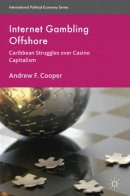The global gambling market is estimated to be worth some US$335 billion and offshore Internet gambling is taking an increasing share of this lucrative market. This is the first major study dealing with Internet gambling as an integral component of the world economy. On the surface, the Antigua−US dispute over Internet gambling appears to make little sense. Unravelling the forces behind this dispute, and how the tiny offshore state of Antigua was able to win a victory through the World Trade Organization over the powerful United States, is the central task of this fascinating book by CIGI Distinguished Fellow Andrew Cooper. The study is intriguing not only for its classic “David versus Goliath” storyline, but also for its depiction of “casino capitalism” — finance as gambling. Cooper takes the connections between casinos and the wider economic system beyond the metaphoric, discussing why the United States attempted to eradicate offshore Internet gambling on a global basis as part of its fight against Antigua. In the era of the Internet, Cooper suggests that gambling has major implications for the politics of the global economy. Reviews “Cooper's study of the global Internet gambling industry captures like in a holographic image the complexities and nuance of contemporary international politics where morality, regulatory and material interests clash and intersect. It is a superb study that questions our conventional notions of power, interest or outcomes in a globalized political economy.” — Ronen Palan, Professor of International Political Economy, University of Birmingham, United Kingdom “As Andrew Cooper shows in this absolutely fascinating book, ‘casino capitalism’ is not just a metaphor for a wheeling-and-dealing global financial system but a massive commercial sector — partly operating in cyberspace — that has been entirely glossed over by International Political Economy scholars. Internet gambling, as Cooper persuasively demonstrates, is not just an extremely interesting case study in its own right but a cutting edge illustration of the international politics of regulating the ‘offshore world.’” — Peter Andreas, Professor of Political Science and International Studies, Brown University, United States “Cooper's analysis provides a gripping story with many lessons for students of International Political Economy, lessons that Susan Strange herself would have appreciated.” — from the Foreword by Eric Helleiner, CIGI Chair in International Political Economy at the Balsillie School of International Affairs and Professor of Political Science of the University of Waterloo, Canada.



